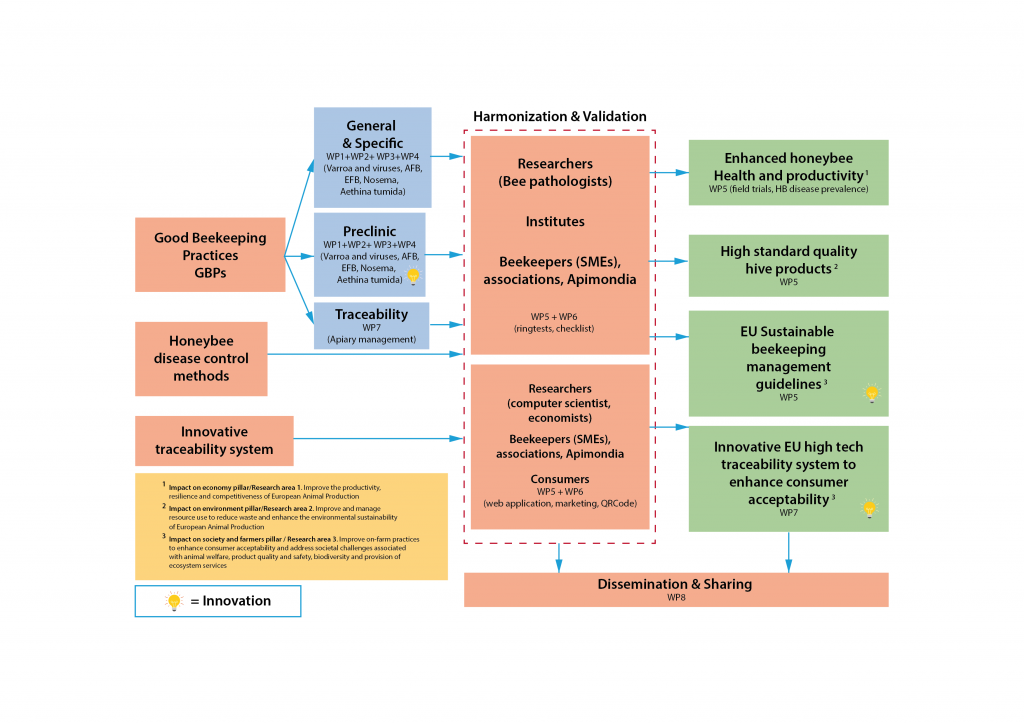Project
The BPRACTICES project aims to develop new management practices (Good Beekeeping Practices – GBPs) adopting new clinical methods, biomechanical and innovative biomolecular techniques respecting the natural behaviour of bees.
The BPRACTICES project is a research project under the Horizon 2020 research and innovation programme and runs from February 2017 until January 2020. BPRACTICES stands for “New indicators and on-farm practices to improve honeybee health in the Aethina Tumida era in Europe”. The project aims to develop new management practices (Good Beekeeping Practices – GBPs) adopting new clinical methods, biomechanical and innovative biomolecular techniques respecting the natural behaviour of bees. In this website, you can find more information and updates about the BPRACTICES project.
The research activities will focus on developing new biosensors from honey to monitor small hive beetle (SHB) presence and PCR techniques to diagnose in advance honeybee diseases (American foulbrood – AFB, European foulbrood – EFB, SHB) from debris. Another goal will be to accelerate and to raise efficiency of the clinical inspection of the hives to detect SHB. At the apiary level we will indicate a proper bee-friendly management (e.g. traps for SHB, honeybee queen-cages for varroa control, powder sugar method to assess varroa infestation level) to monitor and control the honeybee diseases, protecting their health and avoiding the application of chemical treatments guaranteeing quality and safety of hive products.
The innovations will be validated in the daily apiary activities and disseminated internationally in collaboration with the International Federation of Beekeepers’ Associations (Apimondia). Economical impact on beekeeping industry will be quantified.
Consumers will be aware of the positive environmental impact of beekeeping and the ecosystem services provided, thanks to a cutting-edge traceability system using the QR-code/RFID technology.
Problem
Problem
The estimated value of pollination service is between 13.5 and 21.5 billion dollars. European beekeeping suffers significant regional differences in colony losses due to external impacts on beekeeping, including climate and prevalence of diseases. This situation is likely to worsen with the spread of Aethina tumida (Small Hive Beetle – SHB), a new parasite affecting honeybee, found for the first time in the EU in Italy in 2014. Together with other bee diseases (American Foulbrood – AFB, European Foulbrood – EFB and Nosemosis), SHB may play an important role in colony losses and to beekeeping economy.
Goals
Goals
The BPRACTICES project will improve EU beekeeping production system toward the development of an innovative holistic approach (from apiary to jar) considering the GBPs application as the best and systemic tool (considering breeding, housing, welfare and nutrition aspects) to prevent and reduce the honey bee diseases, enhance quality and quantity of hive products, guaranteeing consumers awareness.
The BPRACTICES project will develop a transnational European new system for Bee Healthcare focused on
- preclinical disease approach
- prevention, surveillance and control adopting a sustainable low-environmental impact approach respecting the product’s quality
- consumer’s safety.
Moreover, BPRACTICES include an innovative traceability system (QR Code/RFID based) applied for the first time throughout the entire hive production chain to the advantage of beekeepers and consumers.
Approach
Approach
BPRACTICES project has an innovative approach oriented to the diagnostic and prevention of the majors honeybee diseases (Varroa destructor and associated viruses, American and European Foulbrood, Nosema spp., Aethina tumida) adopting the identification and validation of proper GBPs.
A multidisciplinary approach will be adopted, bringing together scientific research, on-field experience for the validation of the methods, food safety control and economic, societal and commercial analysis. This wide approach will benefit of the participation of experts with different research specialities and abilities, supported by the practical and useful experience of beekeepers.
Aims
Aims
The project aims to develop new management practices (Good Beekeeping Practices – GBPs):
- adopting innovative biomolecular techniques to diagnose in advance honey bee diseases, e.g. like biosensors from honey, PCR analyses from hive debris, powder sugar methods
- setting up methods to control honey bee diseases avoiding the application of chemical treatments guaranteeing quality and safety of hive products (e.g. beekeeping techniques, queen cages, traps.)
These new methods will be validated:
- at the laboratory level, among different countries, in collaboration with EU reference laboratory (ANSES)
- at the apiary level, in the daily beekeeping activities, involving beekeepers of different countries thanks to Apimondia collaboration.
The new sustainable production system will be communicated to the consumers through to an innovative informative technology (QRCode/RFID system) that will allow knowing all the production details.
Outcome
Outcomes
The outputs of the project will be:
- GBPs guidelines, including an economic study on the impact of the GBPs application;
- Innovative methods for laboratory diagnostic
- Sustainable honeybee diseases control guidelines
- A free web-application able to ease
- Beekeepers to monitor the health status of the colonies
- Consumers to have a better knowledge of the hive products to buy.
BPRACTICES will impact on:
- Economy, improving the productivity, resilience and competitiveness of European production from the hives
- Environment, promoting a sustainable and environment-friendly bee management
- Society and farmers, developing an innovative traceability system to share and disseminate innovative on-farm practices and enhance consumer acceptability and awareness of high-quality products coming from a sector respectful of animal welfare, able to improve biodiversity and provision of ecosystem services.

